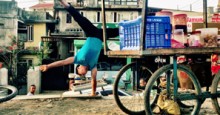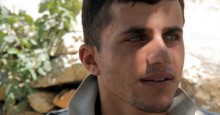What is it like to have God like surgical powers, yet to struggle against your own humanity? What is it like to try and save a life, and yet to fail? This film follows brain surgeon Henry Marsh as he openly confronts the dilemmas of the doctor patient relationship on his latest mission to Ukraine.
Henry is one of London’s foremost brain surgeons, but despite being a pioneer in his field he stills rides an old pushbike to work and worries himself sick about the damage he can inflict on his patients. “When push comes to shove we can afford to lose an arm or a leg, but I am operating on people’s thoughts and feelings…and if something goes wrong I can destroy that person’s character …forever”.
Driven by the need to help others where he can, Henry has been going out to Kyiv for over 15 years to help improve upon the medieval brain surgery he witnessed there during his first visit in 1992. Today the patients see him as the great saviour from the West, desperate parents want him to save their child, and his Ukrainian colleague Igor Kurilets sees him as a guru and a benefactor. But for all the direct satisfaction he gets from going, Henry also sees grossly misdiagnosed patients, children who he can’t save, and a lack of equipment and trained supporting staff. “It’s like selling your soul to the devil, but what can you do? My son had a brain tumour as a baby and I was desperate for someone to help me. I simply can’t walk away from that need in others”.
It is this dilemma however, a dilemma of his own making that is what’s so interesting about Henry, what lets his troubled and compassionate humanity through, and what is the universal theme at the centre of the film; the struggle to do good things in a selfish and flawed world.
“Henry, Henry why do you worry so much?” Igor often exclaims. Things are simpler for Igor because he has only one goal ahead of him; the creation of Ukraine’s first independent neurosurgical clinic. Looking at a famous Kozak painting on his wall at home Igor exclaims that “Kozaks are the heroes of Ukraine…and a brain surgeon is just like a Kozak. It is an adventure – and I love it!”
Devoted to his patients, he has to work within the logistical and political constraints such a maverick career choice presents him with. Instead of an expensive medical drill for boring into patient’s skulls, Igor has bought a cordless Bosch handyman drill from the local market; and because he needed rooms to rent for his independent clinic he has found a temporary refuge in the KGB hospital, the very place which for years housed people who tried to persecute him and Henry for working outside of the State system.
Ironies such as these abound in revolutionary Kyiv, and through patients such as Marian Dolishny we intimately witness life in this topsy-turvy land. Marian is very poor and is from a small town in Western Ukraine. His religious faith helps him cope with a brain tumour which is causing him severe epilepsy, but he knows that it will ultimately kill him.
Marian has been told that his tumour is inoperable in Ukraine, but Henry believes he can save him. To do so Marian must be awake throughout the entire operation however, and this surreal set of circumstances give rise to a dramatic, humorous and unforgettable 15 minute scene filmed with three cameras inside the operating theatre.
Shot over two chaotic weeks in the 2007 Ukrainian winter, the film establishes each of our characters at home, follows Henry and Marian to Kyiv, and then sees Henry work through the endless clinics of desperately ill people Igor wants him to treat. In some harrowing scenes we feel Henry’s frustration as he agonises over who he can and can’t save, yet we are also with him as he sets out to save Marian’s life.
The emotional climax of the film is a journey to the South West of the country where Henry visits the mother of a young girl he tried to save by bringing her to England some years ago. Haunted by the failure to save her life, he shares a very emotional meal with Katya, and then visits the beautiful country cemetery where Tanya is buried. With nothing but the wind and the crows around him he confronts what it means to fail, but ultimately leaves us all feeling redeemed because of his ongoing willingness to try and help others where he can.
Press
“Enthralling, astonishing… Agonizingly human” The New York Times
“Deeply touching, resonant and… very funny” Variety
“…a lovely film, the best documentary for a long time” The Guardian
“A gorgeous and utterly moving portrait” Indiewire
“One triumph that you should not miss” The Independent
“This is one extraordinary documentary, approaching hugely emotive subject matter with nimble delicacy and, it has to be said, steely reserve when it comes to filming a brain operation performed under only local anaesthetic. A life-affirming, unforgettable portrait of a true humanitarian, it’s crying out for a proper cinema release” Time Out
“No scene in any film showing at The Times BFI 51st London Film Festival is tenser than the one two thirds of the way through The English Surgeon… It is the pivotal moment in a documentary which has its world premiere at the festival on Tuesday and is by turns funny, frightening and deeply moving” The Times
“This masterly and poetic film…” Radio Times
“Tense, heartbreaking and humorous, this is an extraordinary documentary” Hotdocs
Awards
Winner, Best International Feature Documentary, Hotdocs 2008
Winner, Silver Baton, DuPont Columbia Awards 2011
Winner, Outstanding Science and Technology Programming, Emmy Award 2010
Winner, Best International Feature Documentary, Silverdocs
Winner, Audience Award, Zagreb Docs
Winner, Audience Award, KOS Health Film Festival
Winner, Best International Documentary, Shanghai TV Festival
Winner, Audience Award, Sheffield DocFest
Winner, Best Film & Best Documentary, Screen East Awards
Winner, Audience Award, Docudays Kyiv



